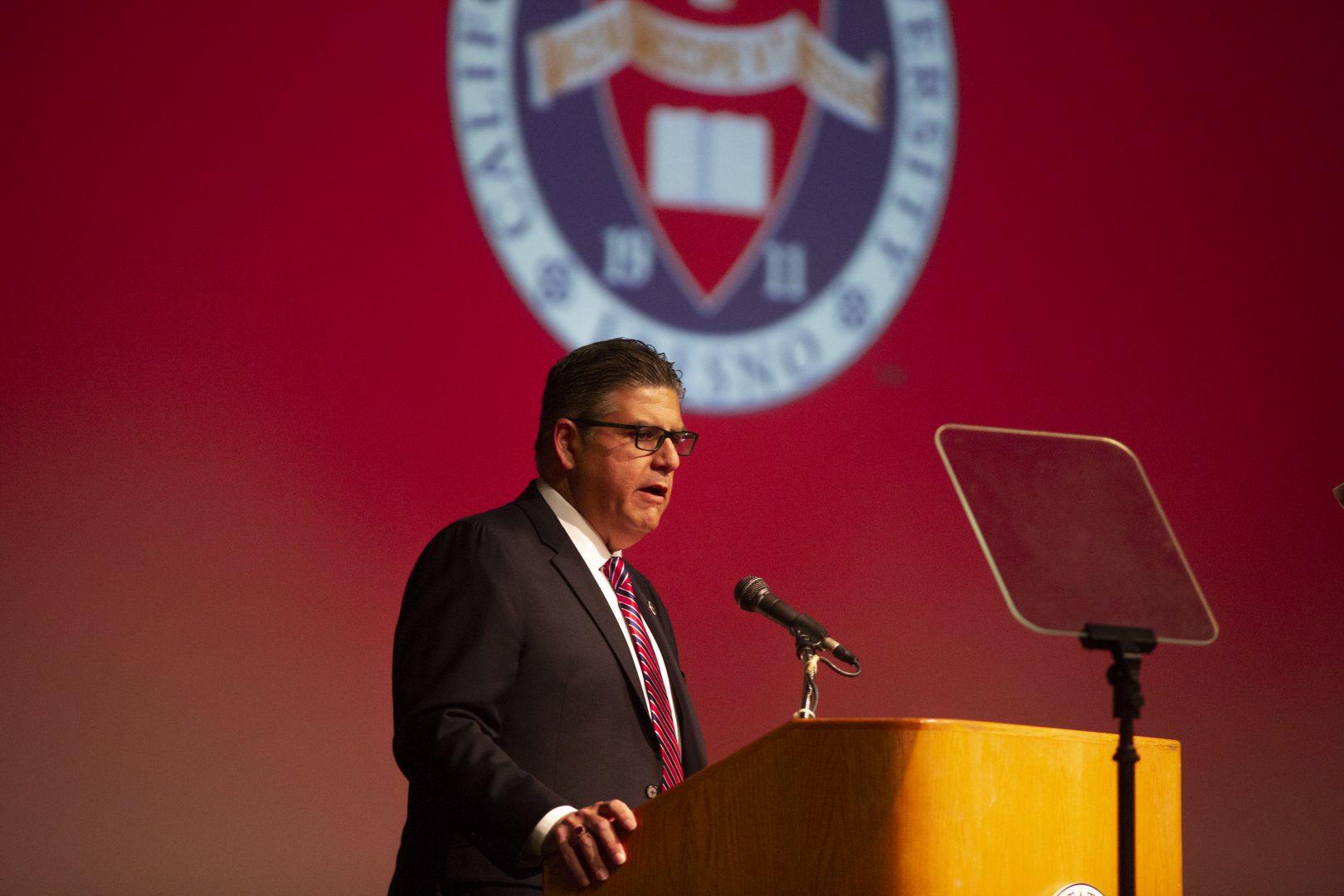Employee and student file lawsuits against Fresno State, CSU and Castro
Larry Valenzuela/The Collegian
Former Fresno State president and CSU chancellor Joseph Castro at the 2019 Fall Assembly on Aug. 19 in the Satellite Student Union.
Mar 7, 2023
Fresno State is being sued after a student and an employee accused the university of mishandling their Title IX cases.
The California State University system, along with former Fresno State president and CSU chancellor Joseph Castro and former administrator Frank Lamas, are also being sued, as reported by USA Today.
The lawsuits were filed in December in Los Angeles Superior Court. Stephen G. Hammers, attorney for both the student and employee, in a Collegian interview pointed out how the CSU Board of Trustees admitted Castro’s mishandling of sexual harassment cases.
“The university has already acknowledged… that the university failed to properly monitor abusive behavior by Mr. Lamas,” Hammers said. “The fact that they acknowledged it, however, does not address the damage to the victims. They’ve had life-altering damage to their lives in different ways. But it’s been a terrible struggle for both of them, and we intend to address that in trials in the Superior Court.”
The lawsuits were filed for negligence, emotional distress, violation of the California Whistleblower Protection Act and harassment and retaliation violation of the Fair Employment and Housing Act.
Hammers said after he and Phillip A. Baker, another attorney, filed the complaints with the court; they now are waiting for Fresno State to “lawyer up” and litigate against them. Litigation can take up to 12 to 24 months until it gets to trial, Hammers added.
As of this reporting, no motions have been filed by the university.
In response to both lawsuits, the CSU system provided a statement to The Collegian. In the statement, it said the student’s Title IX case concluded there were no violations.
“The CSU was recently served and is currently reviewing both lawsuits. In the [student’s] case, that matter alleges conduct between two students. Pursuant to systemwide policy, it was fully investigated by a neutral outside independent investigator, and after a full evidentiary hearing before a separate neutral outside hearing officer, the conclusion was that there was no violation of university policy and no misconduct,” the spokesperson said.
Bernadette Muscat, chair of Fresno State’s Title IX Task Force, said the task force reports recommended changes in university policies.
“The task force identified a lack of campus and systemwide policies to address unprofessional conduct that does not rise to the level of what falls under the penumbra of Title IX and DHR. The task force recommended the development of both campus and systemwide policies to address unprofessional conduct,” Muscat said.
Stephanie Ocampo is the student who filed the lawsuit, going by the name Jane Doe in the filed complaint. She gave permission to use her name for this article, Hammers said. Hammers also provided the official complaints in the lawsuits.
According to the complaint, Ocampo was grabbed from behind by another student, with his forearm around her neck on Feb. 20, 2020. The complaint said she tried to pull away, but the other student placed his hand on her breasts and bruised her neck.
Ocampo went to the Fresno State Police Department the next day, and the complaint accused an officer of asking “inappropriate questions.”
“Including, whether [Ocampo] had ‘flirted’ with the student, and ‘What was she wearing?’ [The officer] went on to ask whether [Ocampo] was ‘laughing’ with the student, and whether she had done anything to ‘provoke’ the student. By the conclusion of the interview, [Ocampo] felt intimidated and emotionally drained. She felt she was at even greater risk than she was before she contacted the police,” it said in the complaint.
Amy Luna, manager of Emergency Operations, said a police report was taken and that Ocampo was provided a Violence Against Women Act (VAWA) packet, which includes various resources. She said the incident was reported to the Title IX office and a Title IX investigation was launched.
“The police officer followed applicable department and law enforcement procedures. The officer was thorough in documenting the details of the incident as reported,” Luna said.
“The Fresno State Police Department works to create a safe environment for the Fresno State community. The department works closely with other campus departments including the Title IX office, the Survivor Advocate and the Student Health and Counseling Center to ensure survivors have access to resources both on and off campus,” she added.
The officer did not did not recommend any campus service and did not take or arrange for a photo of the bruising, according to the complaint.
Ocampo met with Jamie Pontius-Hogan, Fresno State’s director of Title IX and Clery Compliance, on March 3, 2020, and she agreed to a “No Contact Order,” so the accused student would be prevented from coming into contact with her.
Several months later, Ocampo, majoring in Media, Communications and Journalism, was told by a professor that the same student would be in her MCJ 199 Capstone class.
Ocampo requested a formal investigation through the Title IX on Oct. 29, 2021. The officer who initially filed the police report spoke at the trial hearings.
“In [Ocampo’s] case, this manifested in ‘victim blaming’ and shaming [Ocampo] by the university’s police and ultimately in having her claim rejected,” it said in the complaint.
Ocampo’s claim of sexual misconduct was rejected in the Title IX findings.
Pontius-Hogan said she is unable to provide details in regards to specific Title IX investigations or hearings.
“Stephanie’s struggles began way before the Title IX process, with inappropriate, insufficient interviews by campus police. They essentially victim-blamed her, and from that point forward, everything the university did was improper as far as addressing her needs as a victim. That same officer was a witness at the Title IX proceeding,” Hammers said
“So you can imagine that if the attitude of that officer was anything less than helpful in serving to Miss Ocampo at the time he took the report. You can imagine what his testimony would have been like at the time of a hearing that was supposed to be impartial,” he added.
Terry Wilson, now a staffwide union representative, was the employee who filed the lawsuit. He was the first to speak out when news first broke about Castro and Lamas, saying Lamas had multiple inappropriate interactions with him.
“Regarding Mr. Wilson’s lawsuit, we are evaluating his allegations, and take them very seriously. As a current employee and a valued member of the campus community, we will not comment on the specifics of his lawsuit at this time. We appreciate his many contributions to the university,” said CSU in its statement.
The CSU spokesperson told The Collegian that CSU’s mission is to ensure safety on campus and to remain accountable to university community members.
In Wilson’s complaint filed with the court, it said Lamas created a “hostile work environment” for Wilson based on his gender and sexuality. In Wilson’s first week of employment in 2014, Lamas asked Wilson if he was “single, married or gay?”
The use of ‘supportive measure’ in Title IX cases
Pontius-Hogan broke down how the Title IX Office processes complaints in accordance with CSU policy.
“When concerns are brought forward to the Title IX Office, complainants are provided a copy of the Nondiscrimination Policy, and written information about their rights and options, including the option to file a formal complaint. Parties are invited to meet with staff in the office to discuss their concerns and the availability of supportive measures,” she said.
Supportive measures are individualized services offered to a complainant or respondent regardless of whether a formal complaint is filed, according to her.
“They are designed to restore or preserve equal access to CSU education programs or activities, or the workplace without unreasonably burdening the other party, including to protect the safety of all parties or the educational or work environment,” Pontius-Hogan said.
According to the USA Today article, Pontius-Hogan and Ocampo utilized a supportive measure to remove Ocampo from the class she shared with the male student. However, she told USA Today she had to meet with her professor after hours while the other student attended class.
Below are the uses of supportive measures, according to Pontius-Hogan:
- No contact order
- Security assistance
- Increased security and monitoring of certain areas of the campus
- Identifying paths through campus where one is least likely to run into other party
- Campus escorts via FSPD
- Parking in alternative/staff parking lots
- Academic accommodations
- Extensions of deadlines or other course-related adjustments
- Connect with SupportNet and Tutoring Center
- Modification of class schedules, change sections of a course, and substitute a required course
- Withdrawal from individual courses
- Leave of Absence
- Housing accommodations
- Changing on-campus dorms/residence halls
- Terminating an on-campus lease
- On-campus employment
- Extensions of deadlines or other work-related adjustments
- Modification of work schedules
- Changes in work locations
- Assistance connecting to other on-campus and off-campus resources such as medical care, counseling, Services for Students with Disabilities, Survivor Advocate and Employee Assistance Program
The Title IX coordinator is responsible for implementing these measures. They will remain confidential, except when it is not possible to maintain confidentiality, according to Pontius-Hogan.
Correction Nov. 14, 2022:
In a previous version of this article, Terry Wilson’s job title was incorrect in the headline. Wilson is an employee at Fresno State.








bryant garcia • Jan 22, 2025 at 12:10 pm
Being an student, of Fresno State University. The reason of anything is obvious. It is the Fresno State way.